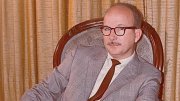Richard Welch ’51 was no James Bond. He had a lifelong aversion to guns and delighted in the intricacies of Aristotelian logic. His bald pate, spectacles, and clipped mustache gave him the air of an Ivy League professor. This would be the image seared into the public consciousness when his photograph appeared across the world.
In fact, Welch was the consummate spy. When he was assassinated by Marxist terrorists outside his residence in Athens in December 1975, he was at the top of his game: a chief of station for the Central Intelligence Agency and a future contender to lead its clandestine service. He remains the most senior CIA officer (his rank was the equivalent of a major general) to be killed in the line of duty. In death, he may have played a part in saving the agency he loved.
Welch had lost the use of his left eye in 1938, at the age of eight, in an accident with an ice pick at home. That year his comfortable life, in which he was driven to elementary school by a chauffeur, ended abruptly. His father, Colonel George Patrick Welch, A.B. 1923, an investment banker who had lost most of his fortune in the Depression, left the family home to become a writer and soldier. Growing up in Providence, Rhode Island, Welch found solace in the study of the classics and won a Harvard scholarship.
He graduated magna cum laude while also making money by frequenting the pool halls of South Boston, betting against blue-collar locals certain they could beat the effete scholar who had foolishly challenged them. His class was strongly patriotic and had, as one classmate noted, a “profound lack of cynicism about government” that perhaps seems quaint today.
Welch was among the reputed 5 percent of the class of 1951 who joined the CIA. He had the distinction of being the only half-blind CIA officer to pass his entrance medical with a rating of 20/20 vision in both eyes. Fortuitously, the vision test involved the opening sentences of Edward Gibbon’s The Decline and Fall of the Roman Empire, which Welch had memorized at Harvard. He was able to repeat it when his right eye was covered.
Welch was endearingly cantankerous and as willing to express himself with the vernacular of an infantry sergeant as that of the erudite man of letters. During an overseas move, he was asked by a CIA bureaucrat to provide a urine sample from his baby daughter. Affronted by this preposterous red tape, he instead supplied a vial of liquid from his basset hound—named after John H. Finley Jr., A.B. 1925, Ph.D. ’33, L.H.D. ’68, the revered master of Eliot House and professor of Greek literature. Afterward, Welch delighted in telling his friends that Finley had passed the test.
Welch served undercover in Athens and Cyprus, blossoming into one of the CIA’s most accomplished recruiters of assets—among them the private secretary to Archbishop Makarios, the president of newly independent Cyprus, which secured NATO’s southern flank. “We knew every breath Makarios took,” a colleague recalled. After station chief jobs in Guyana and Peru, Welch returned to his beloved Greece in the summer of 1975. By then, he was renowned in the CIA as a master of covert political action. The outcomes of general elections in Greece in 1956 and Guyana in 1968 owed much to his clandestine work.
As he turned 46, he wrote to his three children that he felt “exactly the same as I did as a freshman at Harvard, a New England Irishman on the make.” It was a chaotic year for the CIA: Capitol Hill hearings on the agency’s past misdeeds, lurid media revelations, and malicious leaking of names of undercover CIA officers, Welch included.
The anti-CIA tide turned when Welch, targeted as a symbol of U.S. imperialism, was shot dead and President Gerald Ford held him up as an exemplar of service and sacrifice to the nation. Given Welch’s own cunning in influencing events, he probably would have admired the agency’s effective use of his demise. The “CIA did not miss the opportunity to exploit the Welch death,” a colleague wrote, “to smooth the waves of dissent churned up by the congression-al investigations.”
Welch’s funeral at Arlington National Cemetery had all the pomp and ceremony of a state occasion. An agency veteran judged it likely the largest public gathering of intelligence officers in American history. The words “Central Intelligence Agency” appear on Welch’s tombstone, the first time a CIA officer had been identified on his grave.









